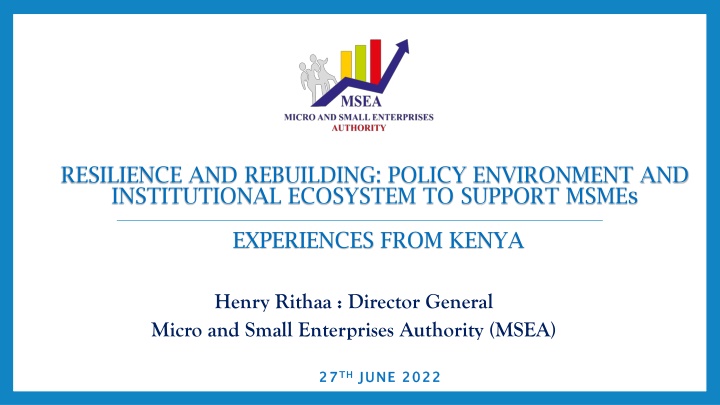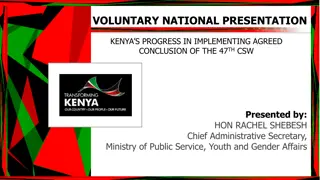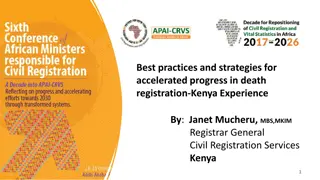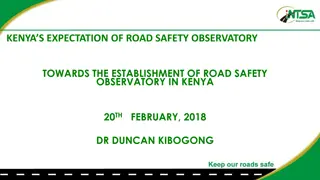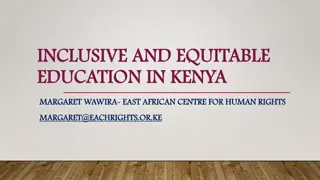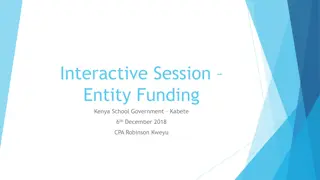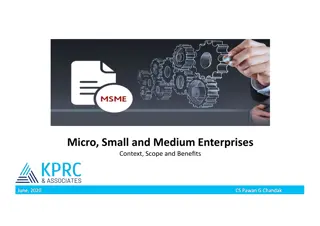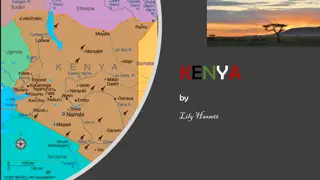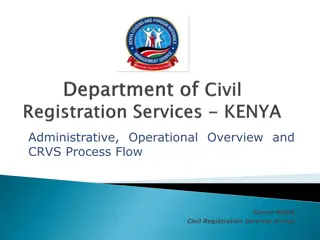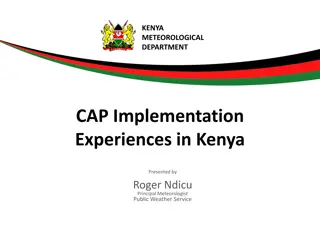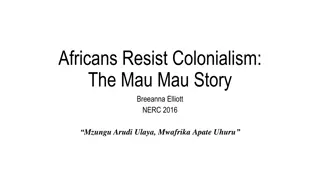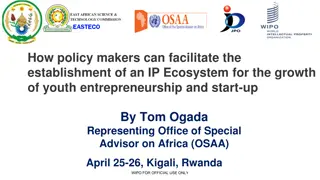Enhancing MSME Support in Kenya: Policy Environment and Institutional Ecosystem
Explore the experiences of MSMEs in Kenya and the efforts of the Micro and Small Enterprises Authority (MSEA) to promote, develop, and regulate these enterprises. Learn about the regulatory framework, challenges faced by MSMEs, and the significance of this sector in Kenya's economic landscape.
Download Presentation

Please find below an Image/Link to download the presentation.
The content on the website is provided AS IS for your information and personal use only. It may not be sold, licensed, or shared on other websites without obtaining consent from the author.If you encounter any issues during the download, it is possible that the publisher has removed the file from their server.
You are allowed to download the files provided on this website for personal or commercial use, subject to the condition that they are used lawfully. All files are the property of their respective owners.
The content on the website is provided AS IS for your information and personal use only. It may not be sold, licensed, or shared on other websites without obtaining consent from the author.
E N D
Presentation Transcript
RESILIENCE AND REBUILDING: POLICY ENVIRONMENT AND INSTITUTIONAL ECOSYSTEM TO SUPPORT MSMEs EXPERIENCES FROM KENYA Henry Rithaa : Director General Micro and Small Enterprises Authority (MSEA) 27 27TH TH JUNE 2022 JUNE 2022
INTRODUCTION MSEA is a state corporation established under The Micro and Small Enterprise Act No. 55 of 2012 and domiciled in the Ministry Industrialization, Trade and Enterprise Development in Kenya. Mandate of the Authority: Promotion, Development and Regulation of the Micro and Small Enterprises in Kenya.
DEFINITION OF MSMEs IN KENYA Micro Enterprise According to the MSE Policy 2020 An enterprise that employ between 1-10 employees and has an annual turn over of less than USD 8,620 (Kes.1 Million). Small Enterprise According to the MSE Policy 2020 An enterprise that employs between 10 50 employees and has an annual turn over of less than USD 43,103 (Kes. 5 Million). Medium Enterprise Not defined in Policy according to KNBS MSME Survey Employs between 50 and 99 employees
MSE REGULATORY FRAMEWORK IN KENYA Established MSEA Established the Registrar of MSEs Established the MSE Tribunal MSE Act of 2012 MSE Policy 2020 Promoting Micro and Small Enterprises (MSEs) for Wealth and Employment Creation Kenya Vision 2030 MSME Development and Promotion Mainstreams MSMEs in Construction of Affordable Housing Program, Manufacturing, Health Sector Development as well as Food Security through agribusiness The Big 4 Agenda
OVERVIEW OF THE MSME SECTOR IN KENYA
SIGNIFICANCE OF THE MSME SECTOR IN KENYA Given the low start up and operational costs, informal sector absorbs labor more easily than the formal sector Job Creation 18.4% of Kenya s GDP is from the informal sector Economic Growth Limiting rural-urban migration by absorbing labor from rural workforce Balanced Development Provides competition to the formal sector with cheaper prices and innovative goods Innovation & Competition Informal employment is a large source of employment for women & excluded youth Gender Mainstreaming
KEY CHALLENGES FACED BY MSMEs Access to decent & safe worksites Access to affordable credit Limited Market access & Linkages Highly informal sector Inadequate Entrepreneurial & Digital skills Liquidity Constraints
CHALLENGES FACED BY MSMEs DURING COVID-19 According to the survey done on the Impact of COVID-19 on Kenyan MSMEs by UNDP and MSEA, out of the sample of 580 MSME surveyed ;
EFFECTS OF COVID-19 ON MSMEs IN KENYA Closure of businesses Disrupted Market Linkages Reduction of employees Reduction in Sales Use of Digital Marketing & payments platforms Disrupted Supply Chain Liquidity Gaps
IMPACT OF COVID-19 According to the survey done on the Impact of COVID-19 on Kenyan MSMEs by UNDP and MSEA;
CLOSURE OF BUSINESSES Close to half of the MSMEs closed business and took more than one year to resume business Proportion of businesses that closed temporarily Period of businesses closure Proportion of businesses that closed temporarily during Covid period (2022) Period businesses temporarily closed during Covid period (2022) Source: MSEA/UNDESA MSME Survey on Impact of Covid 2022
DEFAULT ON LOANS On repayment of the loans, more youth and male led businesses defaulted on loan instalments as compared to women led MSMEs Business loan instalments default during COVID period MSMEs that defaulted loans by type of business leadership Proportion of MSMEs that defaulted on loan instalments Proportion of MSMEs that defaulted on loan by type of business leadership Source: MSEA/UNDESA MSME Survey on Impact of Covid 2022
USE OF DIGITAL PLATFORMS To keep MSMEs on the digital space, Mpesa services and social media dominated payment and marketing space across all types of businesses Marketing platforms Payment platforms Proportion of MSMEs using digital marketing by the type of business leadership Proportion of MSMEs using digital payment by the type of business leadership Source: MSEA/UNDESA MSME Survey on Impact of Covid 2022
GOVERNMENT SUPPORT TO MSMES DURING THE PANDEMIC Reduction in turnover taxes for all Micro, Small and Medium Enterprises (MSMEs) from 3% to 1%. The reduction in tax rate was expected to benefit the MSMEs whose turnover does not exceed USD 43,478. Fast-tracking the clearance of pending bills and acceleration of VAT refunds. Temporary suspension of the listing with Credit Reference Bureaus (CRBs) of MSMEs to provide liquidity, stabilize financial markets and maintain investor confidence in the country. Fast tracking payment of outstanding verified VAT refund claims and pending bills owed to businesses USD 85.7M was allocated. Allocation of USD 6.1M to provide credit targeted to Micro, Small and Medium Enterprises in the manufacturing sector.
GOVERNMENT SUPPORT TO MSMEs DURING THE PANDEMIC Credit Guarantee Scheme (CGS) was established by the Kenyan Government to unlock access to credit by MSMEs. A seed capital of USD 18.3 Million was allocated in the FY 2020/21. Provision of grants and business development training to youth entrepreneurs under Kenya Youth Employment and Opportunities Project (KYEOP). Distribution of hand washing tanks and facemasks to MSE worksites around the country to enable them continue with their operations while protecting themselves from the disease. Moratorium on banks not to increase interest rates. Additionally CBK provided flexibility for loan classification and provisioning for loans that were performing on 2nd March 2020 but need to be restructured because of COVID-19.
OPPORTUNITIES FOR MSMEs IN THE NEW NORMAL Shift to Ecommerce There has been a steep rise in the adoption of ecommerce especially amid the COVID-19 disruptions. Digital Payment Solutions The apparent shift to mobile/digital financial transactions requires enterprises to adopt them as well as invest in opportunities in the digital financial space. Focus on Innovation The covid crisis has been a strong driver of creativity and innovation emerging within the countries affected by COVID-19 to come up with solutions Refined Business Models Door to door deliveries of products is a growing trend
BEST PRACTISES & RECOMMENDATIONS FOR THE FUTURE There is need to create sustainable financing streams for small businesses and to encourage them to scale to a self- sufficient operating threshold. There is also need for an inclusive Credit Guarantee Scheme for MSMEs Increased and More Equitable Access to Credit Micro and small businesses should ensure contractual obligations that they enter into has flexibility to renegotiate payment terms/credit in the unlikely occurrences of crisis situations such as COVID-19 Dynamic Contractual Obligations To prevent and recover from future crises, countries in the region must adapt early and invest in fundamentals like digital skills. This will not only improve their resilience but also their competitiveness Building Digital Resilience
BEST PRACTISES & RECOMMENDATIONS FOR THE FUTURE There is need to incentivize linkages of MSMEs to large enterprises. There is strong evidence that forming alliances, clustering and networking help small firms to compete, grow and cooperate with large firms. Enhanced Sub- contracting/Contract Manufacturing Evidence has showed that bilateral trade taking place within Regional Trading Blocs was relatively more resilient against the global trade collapse of 2020. Strengthened Intra- Regional Trade A great lesson that the COVID-19 taught various economies was the need to establish a recovery fund specifically targeting MSMEs to support their economic survival/recovery in the event of emergencies/disasters. Establishment of a Recovery Fund
BEST PRACTISES & RECOMMENDATIONS FOR THE FUTURE Access to insurance can play a significant role in mitigating risks faced by MSMEs by absorbing shocks, and managing risks associated with irregular and unpredictable income. Tailor-made regulation on insurance products that specifically target MSMEs will contribute to increased uptake. Increased uptake of Micro Insurance There is need for Building domestic demand for locally manufactured goods and services. This goes along a long way in not only local economic growth but also mitigates supply chain disruptions in the event of a global pandemic or related disruptions in global supply chain Import Substitution In order to boost the recovery of MSMEs and prepare them for the future, there is need for enhanced training/sensitization on; Financial Literacy Disaster Preparedness Social Security Value Addition Government Opportunities Enhanced Capacity Building
BEST PRACTISES & RECOMMENDATIONS FOR THE FUTURE Formalization of MSEs There is need to enhance efforts towards the formalization of MSEs so as to have concrete data on the MSEs to not only inform policy but also facilitate economic stimulus support. Enhanced Aggregation Structures There is need to establish sustainable aggregation structures that enables MSMEs meet the demands of both the local and regional market but also enables them to benefit from economies of scale
